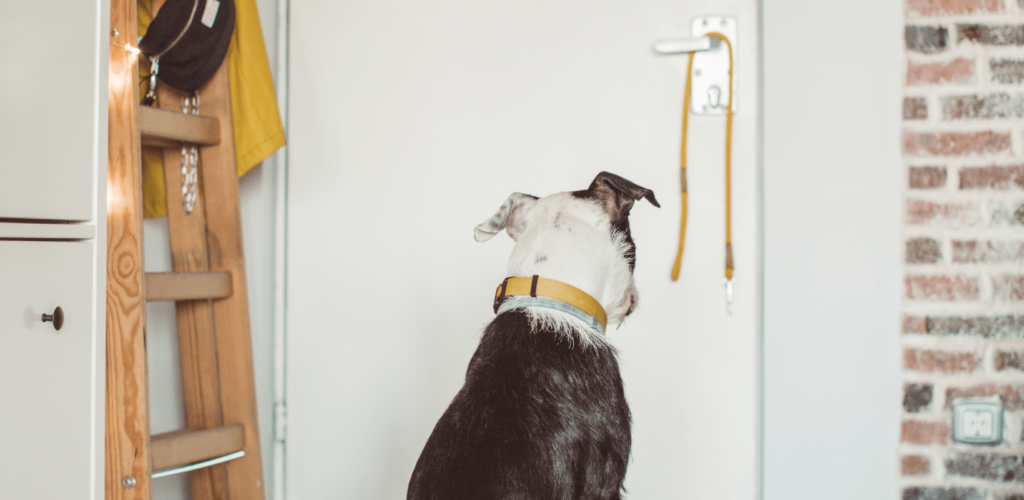
Separation Anxiety is a Panic Disorder
Everyone has an opinion on dog behavior and training. However, when it comes to Separation Anxiety in dogs sorting fact from fiction is especially challenging. Despite what you may have heard from your neighbor, coworker, or sibling, your dog’s anxiety is not your fault! Your dog lacks a fundamental confidence about being alone. Like panic attacks in humans, separation anxiety results in the release of stress hormones in the body. The cause is the fear of being left alone.
The Good and Bad News about Separation Anxiety
The bad news about Separation Anxiety in dogs is that it doesn’t resolve on its own. Your dog isn’t going to just grow out of it. The good new is that you can do something about it to help your dog stress less. Reducing Separation Anxiety requires systematic desensitization. Additionally, there are a number of modalities that you can incorporate into your training protocol.
Supplements like Composure, CBD chews, or Thundershirts may offer some benefit as could pharmaceutical interventions. Speak to your veterinarian and ask for their support on this journey. There’s no reason to make it any harder than necessary. Anxiety medications have decades of safety statistics and quality of life is important, too!
Misconceptions about Separation Anxiety
There are some common misconceptions about the cause of separation anxiety in dogs. Misidentifying the motivation for these behaviors will only increase your own stress and frustration. Remember, your dog’s anxiety is not because of something you did. Let your dog snuggle on the couch or sleep in bed with you if that’s what you like. While increasing exercise and mental enrichment is always a benefit for any dog, it’s also not likely to solve the issue alone. Getting another dog won’t help in most cases and you most likely won’t need to rehome or euthanize your dog.
Conversely, your dog isn’t behaving destructively or having accidents in the house out of spite. He’s not vocalizing for hours just to get attention; he’s crying because he is in a state of panic. Panic or anxiety are emotions and aren’t reinforceable like behaviors are. Whining for food at the dinner table is a reinforceable behavior. It implies your dog is in a state conducive to learning. A dog in a state of panic is not likely to learn what you want them to do. If the underlying panic is treated appropriately, vocalizations and other signs of distress will reduce, as well.
Utilizing all Your Resources
If you’ve be struggling with separation anxiety you may be feeling like there is no hope. Luckily, with the right exercises and guidance you’ll be able to decrease your dog’s anxiety about being left alone. It will, however, require diligence and patience on your part. You’ll also have to ensure that your dog is not ever left alone beyond what they can tolerate, whether that’s 2 minutes or 2 hours.
You’re about to spend a lot of time together with your dog. It’s important to avail yourself of all the resources possible. If sending your dog to daycare in order to avoid alone time isn’t achievable, reach out to your community. Reach out to family, friends, or neighbors for help filling gaps in your schedule. Remember to consult with your veterinarian, also!
Frequently Asked Questions about Separation Anxiety
Will Crating my dog or leaving a chew help?
A common suggestion for addressing separation anxiety is through kenneling. While some dogs do well with being crated, many become destructive or self-injurious when confined. Some dogs also eliminate in their kennel leaving them filthy when you return. There may be a better compromise that keeps a majority of the home off limits while giving them a little more room. Alternatively you’ll need to find someone who can keep your pet company when you can’t be there.
Chews fulfill a natural need in your dog but this need is best addressed when you are present and your dog feels safe. Many dogs lose their appetite when they are under stress and won’t eat the chew while you are gone. Even if your dog consumes the chew or food, they can still feel extreme levels of stress.
Doesn’t my dog need to know when they’ve been bad?
Your dog doesn’t inherently know right from wrong as these are human constructs. All they know is whether is something is safe or dangerous. If your dog is in a state of fight or flight, such as when they are distressed due to separation, they cannot effectively learn what they are supposed to do. Elimination, vocalization, and destructiveness are reflexive symptoms of underlying anxiety, not conscious decisions based on reinforcement history. They will not be able to associate their actions with chastisement or corporal punishment that occurs hours after the action. Punishing your dog for behavior caused by distress long after the action will only lead to greater levels of anxiety that harm your relationship.
Does my dog need to know that I am Alpha?
The concept of the Alpha, or pack leader, is based on a debunked study of captive wolves. Your dog is not a wolf and that study did not reflect how wild wolf packs function in nature. No matter whether it’s Separation Anxiety or obedience training your dog deserves a handler who is patient and understanding. ‘Dominating’ your dog or forcing them to be ‘submissive’ has no place in evidence-based dog training. A dog experiencing distress, no matter the cause, deserves empathy and a good handler will take steps to eliminate any source of fear, anxiety, or stress during the learning process.
If I reward my dog for seeking attention won’t the behavior get worse?
A dog that suffers from separation anxiety is not attention seeking, they are expressing symptoms of panic. Rewarding a dog for polite behavior when they are in a calm and relaxed state is completely different than ignoring an animal in distress. It’s okay for your dog to solicit your attention and seek comfort just as it is for a child to solicit the attention of a parent. If that child falls and scrapes their knee, addressing their pain and providing comfort gives them relief and any crying subsides as a result. An animal that cries in distress will not stop until their needs are met. Waiting only reinforces that being alone is scary.
We can help!
Is your dog experiencing Separation Anxiety? Call us at 913.712.8742 to set up a virtual Separation Anxiety consultation. We’ll give you step by step exercises designed to systematically desensitize your dog to feel more comfortable with being alone. In the meantime, start exploring technology to help you visualize what your dog does when you leave the house.
Canine Solutions is based in Spring Hill, KS and provides in person services to all of Johnson County, KS (Leawood, Lenexa, Gardner, Bucyrus, Overland Park, etc.) as well as parts of Miami Co, Douglas Co, and Kansas City, MO. We also offer online consultations and virtual courses!
